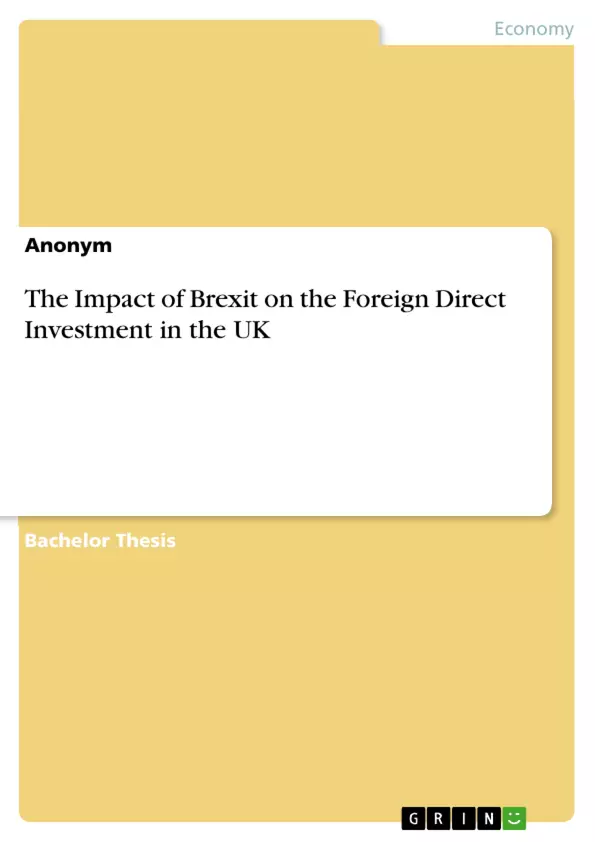This e-book is not just a thesis; it's a comprehensive guide for anyone seeking to comprehend the complex interplay between Brexit and Foreign Direct Investment. Whether you're an academic, a business professional, or an individual with a keen interest in economic trends, "The impact of Brexit on the Foreign direct Investment" offers valuable insights that transcend disciplines, making it an essential addition to your digital library. Order your copy today and equip yourself with the knowledge to navigate the evolving economic landscape shaped by Brexit.
The Referendum in 2016 which led to the Brexit was a game-changing event for both politics and the economy in Great Britain and the European Union. For the first time ever in history, a country decided to leave the EU. From the beginning it was clear that this decision would have both political and economic consequences. The UK was the second-largest economy in the EU and a very important location for the financial sector. The city of London is one of the largest business areas in total Europe. Before the referendum in 2016, many experts were concerned about the consequences of a “leave”-vote. George Osborne, the british minister of finance warned that the Brexit will cost every household 4300 pounds per year. According to the financial times, the GDP in the year 2030 would be six percent lower if they leave the European union, under the condition of a trade agreement between the two partners. This Bachelor´s thesis will focus on the impact of Brexit on the foreign direct investment in the UK and the consequences for example on the job market. The first part will be the summary of the working paper. “The Influence of Brexit on the Foreign direct Investment Projects and Inflows in the United Kingdom”, that was written by Mihaela Simionescu and was provided in cooperation with the Global labour Organization (GLO).
Inhaltsverzeichnis (Table of Contents)
- Introduction
- Summary of the working paper “The influence of Brexit on the Foreign Direct Investment Projects and Inflows to the United Kingdom” by Mihaela Simionescu
- Introduction
- Literature Review
- Methodology
- Gravity approach based on Mixed-effects poisson regression models
- Differences-in-differences approach
- Variables and Data
- Results
- Conclusion
- Discussion
- Summary of the paper “Brexit and foreign investment in the UK” by Nigel Driffield and Michail Karoglou
- Introduction
- Overview of the foreign direct investment time series literature
- Importance of Brexit for foreign direct investment
- The model
- Data and econometric methodology
- Results
- Conclusions of the paper
- Discussion
- Conclusion
- Literature
Zielsetzung und Themenschwerpunkte (Objectives and Key Themes)
The main purpose of this Bachelor's thesis is to analyze the impact of Brexit on foreign direct investment (FDI) in the UK and its implications for the job market. The thesis utilizes two working papers as the primary sources for its analysis: “The Influence of Brexit on the Foreign Direct Investment Projects and Inflows in the United Kingdom” by Mihaela Simionescu, and "Brexit and foreign investment in the UK" by Nigel Driffield and Michail Karoglou.
- The impact of Brexit on FDI projects and inflows in the UK.
- The relationship between Brexit and job creation in the UK.
- The methodology and models used to analyze the impact of Brexit on FDI.
- The potential consequences of Brexit for the UK economy, particularly the financial sector.
- The role of the UK government in mitigating the negative effects of Brexit on FDI.
Zusammenfassung der Kapitel (Chapter Summaries)
The first part of the thesis summarizes Mihaela Simionescu's working paper, which examines the impact of Brexit on FDI in the UK using two proxy variables: FDI projects and FDI inflows as a percentage of GDP. Simionescu utilizes the gravity model and a differences-in-differences approach to analyze the data. The author concludes that the number of FDI projects could decrease by 65% to 90% after Brexit and suggests that the UK should consider following a cooperative model similar to Norway's relationship with the EU to mitigate the negative effects.
The second part of the thesis summarizes Nigel Driffield and Michail Karoglou's paper, which focuses on the impact of Brexit on FDI in the UK. The authors provide an overview of the FDI time series literature and discuss the importance of Brexit for FDI. They develop a model to analyze the impact of Brexit on FDI and present their findings based on data and econometric methodology. The paper concludes that Brexit is likely to have a negative impact on FDI in the UK.
Schlüsselwörter (Keywords)
The core concepts explored in this thesis include Brexit, foreign direct investment (FDI), the UK economy, job market, gravity model, differences-in-differences approach, trade barriers, supply chain management, and the financial sector. The thesis also examines the role of the UK government in mitigating the negative effects of Brexit on FDI.
- Quote paper
- Anonym (Author), 2022, The Impact of Brexit on the Foreign Direct Investment in the UK, Munich, GRIN Verlag, https://www.grin.com/document/1442666



